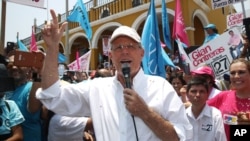The two leading candidates in Peru's presidential campaign face the possibility of being tossed from the race with three weeks to go until the election in a contest that has already seen two others disqualified.
Peru's electoral board said Monday that they had received a citizen's petition with allegations that Pedro Pablo Kuczynski, a 77-year-old former World Bank economist and favorite of investors, broke a new law against buying votes.
The board is investigating a similar allegation made against longtime front-runner Keiko Fujimori, the daughter of imprisoned former President Alberto Fujimori.
Last Thursday, Francisco Tavara, president of the National Jury of Elections, said at a news conference that Fujimori and other candidates might still be barred from the race as inquiries into wrongdoing were not yet completed.
Disqualifying both or either Fujimori or Kuczynski, the established center-right candidates, would again turn the race on its head and likely boost two left-leaning candidates before the vote April 10.
Fujimori and Kuczynski together represent nearly 50 percent of voter intent, according to an Ipsos poll.
Cash, beer
The new law has already led to the ouster of one presidential hopeful, wealthy former governor Cesar Acuna, after he handed out cash to poor voters.
Unlike Acuna, however, Kuczynski and Fujimori denied the allegations and are seen by Peruvians as having a better chance of staying in the race.
Deliberations over the future of both candidates could drag on for more than a week. The election winner would replace President Ollanta Humala, whose five year term ends this year.
Many have questioned the fairness of this year's race after Julio Guzman, a centrist technocrat who had surprisingly surged to second in polls, was disqualified because his party did not comply with minor electoral procedures.
Protesters have accused the electoral board of favoring Fujimori. The electoral board has denied political bias.
In a video that emerged on social media Sunday, Kuczynski is seen on a stage waving his hand to a cheering crowd after a man beside him announced that Kuczynski had brought 15 crates of beer for each neighborhood in an Andean town.
Kuczynski said he left shortly afterward and did not buy or distribute the beer. "I didn't give anything to anyone," he told reporters Monday.
Fujimori has denied any wrongdoing for presiding over an event where cash prizes were distributed to the winners of a breakdancing competition.






